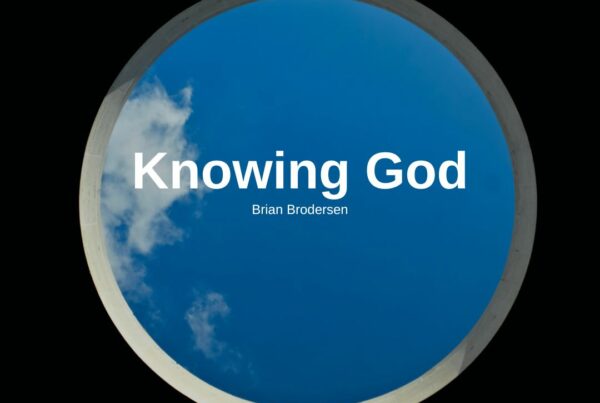
A conversation with the right person at the right time can change everything.
The other day I walked out of an interview gone wrong. Reeling from embarrassment over circumstances entirely out of my control, I reached out to some friends that had been praying for the interview. We talked, I was heard, and, more importantly, understood. But throughout the discussion, I became aware that my attitude wasn’t quite right. Each friend detected undertones of self-righteousness, hurt privilege, and that little voice that still wants to stick it to the man. I walked away from our conversation well on my way to repentance … and a more compassionate heart towards those who wronged me.
A heartfelt conversation can change everything, especially when the Holy Spirit is involved.
Recently I wrote an article titled, “Gospel-based Differentiated Unity,” in which I advocated for covenant-based relationships in the Church that mirror, and are empowered by, what Christ has done for us. We wouldn’t need to be conformed to an image of another’s real or imagined expectations but free to be transformed by “the renewing of our minds” (Rm12:1-2). Our interactions could then celebrate diversity with our brothers and sisters in the image of the One who gave His life to redeem us. I want to take a new step in the same direction and talk about conversation. Specifically, I’d like to talk about how our exchanges could be authentic and seasoned with grace, like the ancient conversation in Genesis 1:26. So it’s in following this desire that I’d like to begin at the beginning.
The Conversation in Genesis 1:26
Theologian Louis Berkhof found convincing proof of our Triune God in the written conversation in Genesis 1:26. I find that fascinating because it speaks to me of God’s original design for our relationships. God, in dialogue, reveals His plan to create man in His image. In this little passage, the Lord models community and relationships while laying out the Creation story for all to see.
We must remember the holy ground we tread when speaking about who God is. He is altogether other than we are. In John Frame’s words, God is both transcendent and imminent, meaning He is above all, holding all together and yet close, knowable as He reveals Himself in Scripture. He has chosen to dwell in His adopted children through the Holy Spirit. He is one triune God, in the sense of the Nicene Creed, or as the Belgic Confession states clearly: “ […] God, who is the one single essence, in which are three persons, really, truly, and eternally distinct, […]. ” In other words, Jesus told us that the Father spoke through the Son (Jn 12:49) who is the Word (Jn 1:1) and reveals truth through the Spirit (Jn 14:26), even as He is the truth (Jn 14:6) as shown in Scripture (Hb 10:7).
In Genesis 1:26, the ESV translates the scene: “Then God said, “Let us make man in our image, after our likeness.” If we go too fast, we might miss it, because it’s right under our nose. God is talking, but not like my grandmother, who used to say she would speak to herself because she was the one good woman she could trust. He’s conversing. He’s collaborating. This can only be done with someone and only be done well with someone we love. As Vern Poythress writes: “Love characterizes all three persons of the Trinity. […] They exist in a special relation to each other, in the fellowship of the Holy Spirit.”[1] Love is at the heart of the conversation in Creation when God reveals how He will create man. We see this in how God continues to deal with humanity, especially in sending His Son to save them.
The Power of Conversations Based on Love
The words of Genesis testify to an ongoing relationship. We are only at the beginning when it’s understood that man will bear the image of God. Looking into the conversation and the origins of our communion with Him tells us how we should communicate. It should be like the conversation I had with my friends, who listened and helped me even when at first I didn’t agree with them. Ours was a perspective-changing conversation based on love.
I like how Pierce Taylor Hibbs put it: “God is the self-communing Trinity, one being in three persons, each of whom eternally glorifies and loves the others so deeply that our earthly reflections of glory and love pale in comparison.”[2] This language spoken in the Trinity is the basis of our fellowship. As the Trinity speaks in honor and love to each member, and as God’s image-bearers, we have an example for relationships. It’s covenantal as it flows from God; it’s respectful to others in the love Christ has poured out in our hearts through the Holy Spirit (Rm 5:5).
The Art of Conversation: Authenticity Seasoned with Grace
To return to the need for Gospel-based differentiated unity, I believe we might want to start with the art of conversation: the two-way exchange of ideas in mutual respect and brotherly love. That doesn’t mean we must be overly nice and affectionate, or as the French say, like the Care Bears (bisounourse). We can be natural. Humor is a powerful tool but can also be a cloaking device shielding us from transparency. Though we don’t always have to agree, we can go deep. It takes time, patience, and humility to listen to what might be challenging to hear. Overall, we need the Holy Spirit’s transforming work to learn to love more like Jesus. That would allow us to learn from our differences without suspicion.
The time for discussion could be one that changes us, and quite possibly, those who listen to us. Our lives could be the testimony that matches our words, and maybe others might want to join in the discussion. “Let us make man in our image” is a conversation that calls us to a higher level of communication and living. Perhaps, by the power of the Spirit in us, we could feel safe to join in with each other. And maybe then, within our conversations, we could show those that don’t know Him yet the love of Jesus.
[1] Vern S. Poythress, Knowing and the Trinity (Philadelphia: P&R Publishing Co., 2018), 70.
[2] Pierce Taylor Hibbs, The Speaking Trinity and His Worded World: Why Language Is at the Center of Everything (Eugene, Oregon: Wipf and Stock Publishers, 2018), 29.










